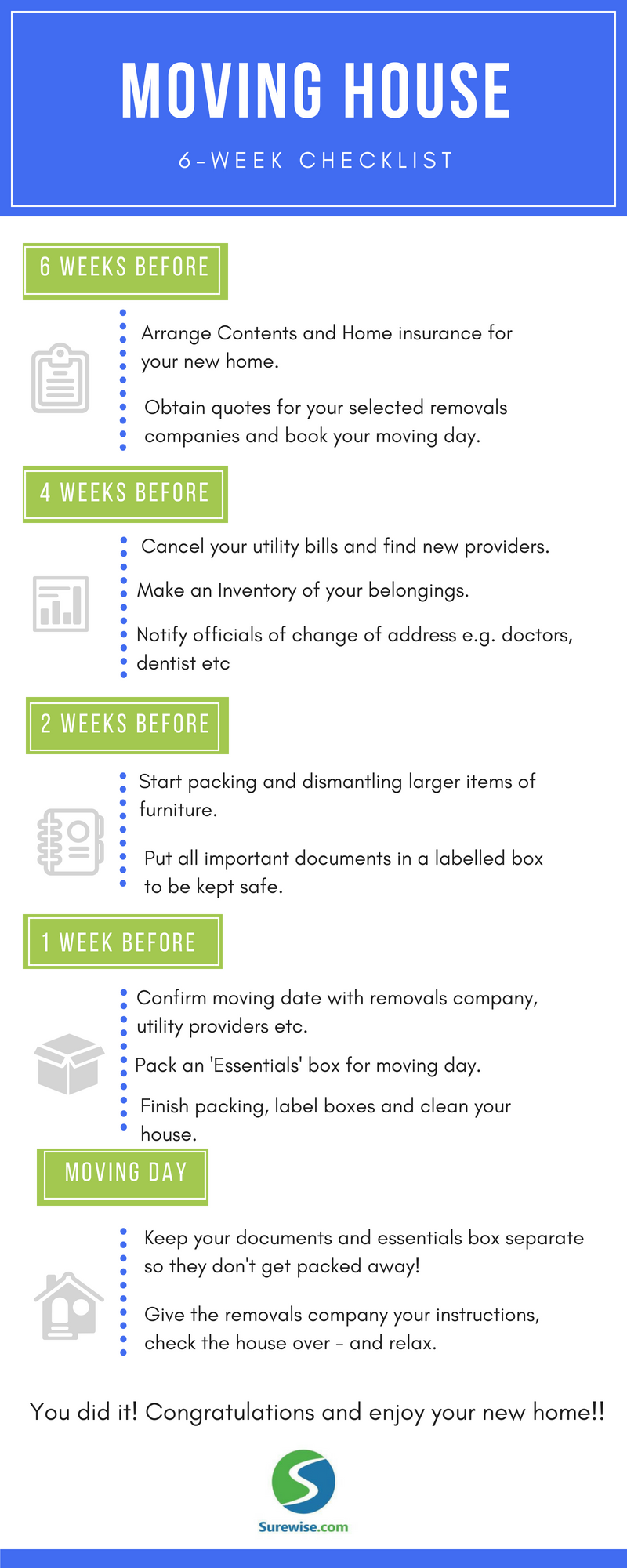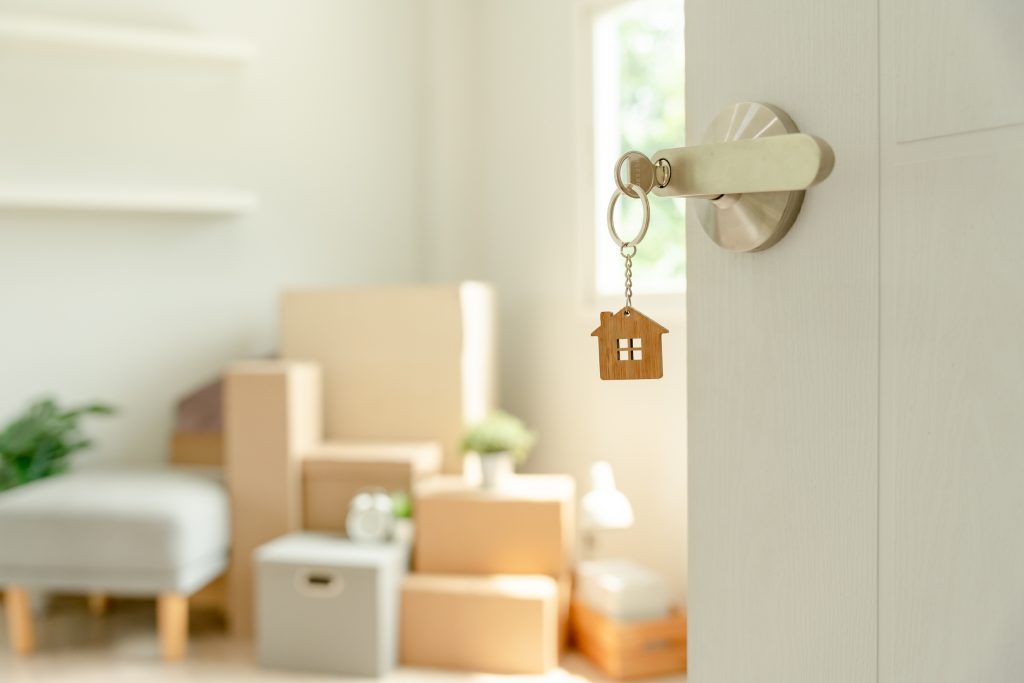There are so many things to do when moving house, but the key is to be systematic and work through everything one step at a time. In this comprehensive guide, we’re going to talk you through every aspect of the moving process so that you know exactly what you have to do.
We will start with a simple checklist that you can work your way down while moving day gets closer.
As you’ll see below, we recommend you start getting ready for your moving day at least 6 weeks in advance so that when the removals team arrive, all that’s left to do is sit back and look forward to arriving in your new home.
Moving House Checklist
Here are 20 essential things that will allow you to move home quickly, efficiently, and with the minimum of stress. Start at the top, leave yourself plenty of time, and work all the way to the bottom:
- Give Your Notice
- Book Your Removals Company and Moving Day
- Check Your Vehicle & Plan Your Route
- Declutter Your Home Before Moving
- Put Non-essential Items in Storage
- Arrange Home and Contents Insurance Transfer
- Update Your Details
- Cancel Your Utility Providers
- Organise New Utility Accounts
- Organise School Transfer (If Applicable)
- Redirect Your Mail
- Tell Your Friends
- Contact Your Solicitor or Estate Agent
- Make an Inventory
- Pack Your Belongings
- Pack an Essentials Box
- Keep Valuables Safe
- Take a Record of Utility Readings
- Do a Final Walkthrough
- Take a Moment to Say Goodbye
How Far Ahead Do You Need To Start Planning?
Of course we recommend leaving yourself as much time as possible, however we understand this isn’t always realistic. Having an idea of your moving date in advance will depend on whether you are buying or renting, the buying process is often more unpredictable and lengthy.
That said, you don’t want to spend a month in your current home with everything boxed up and in storage. Starting the real work around 6 weeks before your moving day provides a nice balance.
6 Weeks Before Moving
1. Organise your Moving House Checklist into a folder or board so it’s easy to manage.
2. Obtain quotes for your selected removals companies and book your moving day.
(Remember: the cheapest price isn’t necessarily the best price, so read the reviews and what each company will provide on your moving day before making your selection!)
3. Arrange Contents and Home Insurance for your new home. You may be able to contact your current provider to discuss your existing policy – but do not cancel your existing policy before you have moved home!
4. Change of Address – Notify all necessary companies of your change of address.
This may include:
– Doctors
– Dentist
– Insurance providers (car, home, life, travel etc)
4 Weeks Before Moving
1. Cancel Utilities – Be sure to notify your utility providers of your moving date so that the power, water bills etc are no longer charged to your account once you have moved.
2. Find new utility providers – You will also need to ensure you have arrangements for utility providers in your new home for the day you move in – the last thing you want is to arrive in your new home and find you have no access to water!
3. Schools – If you have children, you will need to notify the school if your child is leaving, and make arrangements for them to join a new school in your new neighbourhood.
4. Make an Inventory – make an inventory of all the items you will be taking with you, and what will be moving into what room in your new home. This will make it far easier to keep track of what has been packed and what hasn’t, and what needs unpacking when you’re in your new home! If you are selling your home, you will be asked to let your buyer know everything that is staying or going, including light fittings and curtains.
2 Weeks Before Moving
1. Start Packing – You may be able to obtain packing materials from your moving company, and some companies even offer a packing service themselves. However, if you are packing up your home yourself, starting now is a good way to stay prepared in the run-up to moving day.
Supermarkets are also a great place to find boxes for free, you may need to notify them in advance so that they can save you some.
2. Start by dismantling larger items of furniture and boxing up items you will not need before the move. Take a moment to label your boxes and to make it easier to unpack at the other end. You may also want to consider self-storage when downsizing if you have a lot of furniture or large items.
3. Put all important documents in a secure, clearly labelled box. You will want to keep this box separate from this rest and travel with it on your moving day to make sure you have everything you need.
4. Review your Moving House Checklist to make sure all the items from the previous weeks have been completed.
1 Week Before Moving
1. Confirm – Call your removals company, utility providers, broadband and phone providers and confirm your moving dates with them. This will make sure there are no unexpected surprises on the moving day itself!
2. Finish Packing – By this point, you should have most of your house packed up and ready to go. Remember to pack an essentials box for you and your family with a spare change of clothes each, snacks and water, pyjamas and bedding so you don’t have to rifle through your boxes to get ready for your first night in your new home.
3. Label Your Boxes – If you haven’t already, make sure you add labels and tags to all of your boxes so that you know which rooms they need to go in.
4. Clean – It’s also a good idea to give your home a thorough clean before moving out. Make sure to give yourself plenty of time by starting to clear out the house at least a week before the moving day itself.
Moving Day
On moving day, your hard work should have paid off and you shouldn’t have many last-minute tasks to do! Be on hand to help the removals team with what boxes need to go where make sure you have all your important documents and your essentials box on hand.
Before leaving, give your house a final once-over to make sure nothing has been forgotten or left behind, and then try to get to your new home to help to removals staff with where boxes need to be left.
Being systematic and working quickly but without rushing is what will make every part of moving day go smoothly. Keep ticking off all the little jobs, and you will be settling into your new home before you know it.
Most importantly, enjoy your new home!
Download this checklist for later:

20 Moving House Must-Do’s
Give Your Notice
If you are currently renting your property, you’ll need to give your landlord notice of your intentions to move home. Carefully check the contract you have to find the required notice period. Many people choose to give themselves a slight overlap between moving out of their rented home and into their new home to ensure they have some leniency should there be any last-minute delays.
Book Your Removals Company and Moving Day
Obtain a few different quotes from removals companies for your move, and book your moving day once you’ve found the right company for you.
Remember that the summer months can be a particularly busy time to move house, so ensure you’ve secured your slot in plenty of time.
Check Your Vehicle & Plan Your Route
The moving company will not be insured to take you as a passenger in their van or lorry. You will need to travel to your new home in your vehicle, so make sure that it is ready to travel to your new home. Check your tyre pressure and fuel prior to moving day to ensure you can have a hassle free journey.
It is likely you have already driven to the property at least once when you went to view it but having a satnav ready is a good idea to ensure your journey is smooth.
Declutter Your Home Before Moving
Decluttering your home before you move house will save you a lot of time and money. There is no point in packing and transporting everything to your new home only to realise you don’t use half the things you’ve moved.
Think of your new home as a fresh start to clear out the clutter and only take the things that you use and need with you.
Put Non-Essential Items in Storage
If you have some larger items of furniture or a large quantity of items that you want to keep, but aren’t essential, you could consider putting them into storage short-term. Moving house can be stressful, but self-storage can be an effective way to reduce that stress.
Many people use self-storage when moving home to keep their belongings safe and secure, save money, and reduce stress on moving day. Find out more about self-storage and common mistakes to avoid and make sure that your valuables are always protected with our self-storage packing tips.
Arrange Home and Contents Insurance Transfer
You’ll need to update your home and contents insurance to apply to your new home as soon as possible to ensure you have seamless cover on your moving day.
If you currently rent or don’t have home insurance for another reason, this is an essential item to tick off and keep your home and possessions covered from unexpected incidents.
Update Your Details
Make sure you’ve updated your change of address with other relevant bodies. This includes, for example, your GP, driver’s license, other insurance providers (car insurance, phone insurance, travel insurance etc), your banking provider, and other subscriptions and services you use.
Cancel Your Utility Providers
Cancel your utility providers approximately 4 weeks before you are due to move to ensure you have met their required notice period. Take a photo of your meter reading on the moving day to ensure you have evidence of your readings should there be a dispute at a later date.
Organise New Utility Accounts
Likewise, make sure you have organised new utility accounts for your new home to make sure you’re not without water or electricity once you’ve moved!
Organise School Transfer (If Applicable)
If you have children and are moving a significant distance away, you may need to change your child’s school. This is something you should aim to have in place as soon as possible to ensure a seamless and stress-free move for your children.
Redirect Your Mail
When notifying the relevant parties of your change of address this should prompt them to update your mail address accordingly. It’s also a good idea to arrange for any other mail to be redirect to your new address.
You can then find what post is still going to your old address and update them of your new details.
Tell Your Friends
You may have already announced your house move to your friends and family, but don’t forget to forward on your new address so your loved ones have it.
Contact Your Solicitor or Estate Agent
A week or two before the moving day, make sure you’ve confirmed your move with your estate agent and solicitor to ensure there aren’t any last-minute delays. They will be in constant contact with you so that any unforeseen issues they encounter are raised without delay. Open lines of communication and quick replies will make moving so much easier.
Make an Inventory
When you begin packing, take an inventory of everything you are packing and what is going into each box.
Using a QR code scanner can be a helpful way of ensuring your belongings are packed as efficiently as possible.
Pack Your Belongings
This step is often in tandem with taking an inventory, but packing your belongings is, of course, an essential part of moving house!
Our packing tips for self-storage as just as applicable for a house move and will help you ensure your belongings arrive to their home damage-free.
Pack an Essentials Box
It can take time to unpack all of your belongings, and that’s often the last thing you want to be doing after a long day of moving.
Packing an essentials box with items such as bed sheets, pajamas, your kettle and mugs, snacks, toothbrushes, etc is a great way to ensure you have all the immediate things you need without having to go rummaging in piles of boxes.
Keep Valuables Safe
It’s easy for things to get misplaced in the chaos of moving day. Make sure you’ve got your valuable items – purse, new house documents, legal correspondence, keys, phone, etc – stored in a safe place (ideally a bag that you will keep with you throughout the day).
Take a Record of Utility Readings
Finally, take one final recording of your meter readings for your utility providers before leaving your old home.
Do a Final Walkthrough
Taking your time to make sure that nothing has been missed or overlooked is one of the key things to do when moving house because it’s all too easy to rush the process. Yes, you want to be quick and efficient, but you don’t want to be so fast that you end up rushing crucial steps. A final walkthrough will ensure that you can sleep with peace of mind.
Take a Moment to Say Goodbye
Once all the hard work is done and you’re loaded up and ready to go, let the removals team know that you want a few minutes alone to say goodbye to your home. Taking a moment to process your emotions will make it so much easier to settle in quickly in your new home.
All that’s left to do then is enjoy your new home and getting everything exactly how you want it!
Top Tip: Did you know that a recent study on the best time to move house found that over a third of people choose to move on Friday, but only 2% choose Sunday? And if you have more flexibility, choosing to move in the summer is the most popular because of the extended daylight and good weather.
Key Takeaways
Moving home is all about being systematic and pacing yourself as you work through things one step at a time:
- Follow a checklist and tick things off so a crucial little job is never missed
- Stay motivated by picturing yourself resting and relaxing in your new home
- Look at self-storage facilities for larger items, particularly if you’re downsizing
FAQ’s
Is it expensive to move house?
The precise cost of moving house is determined by the size of your old home, the size and location of your new home, and your individual needs. If you have to make use of a self-storage facility, for example, this can increase the price of moving. Time off work should also be factored into your calculations.
When should you start packing?
Our checklist for moving house is designed to take approximately 6 weeks to work through from beginning to end. This will give you plenty of time to manage the rest of your everyday obligations, take a break when you need to, and solve any unforeseen issues that may arise.
What should you not pack?
Medication, ID, and any perishable items should be taken with you as hand-carried items on moving day. This will ensure that you have the most important things at your disposal should you need them while everything else is in transit.







